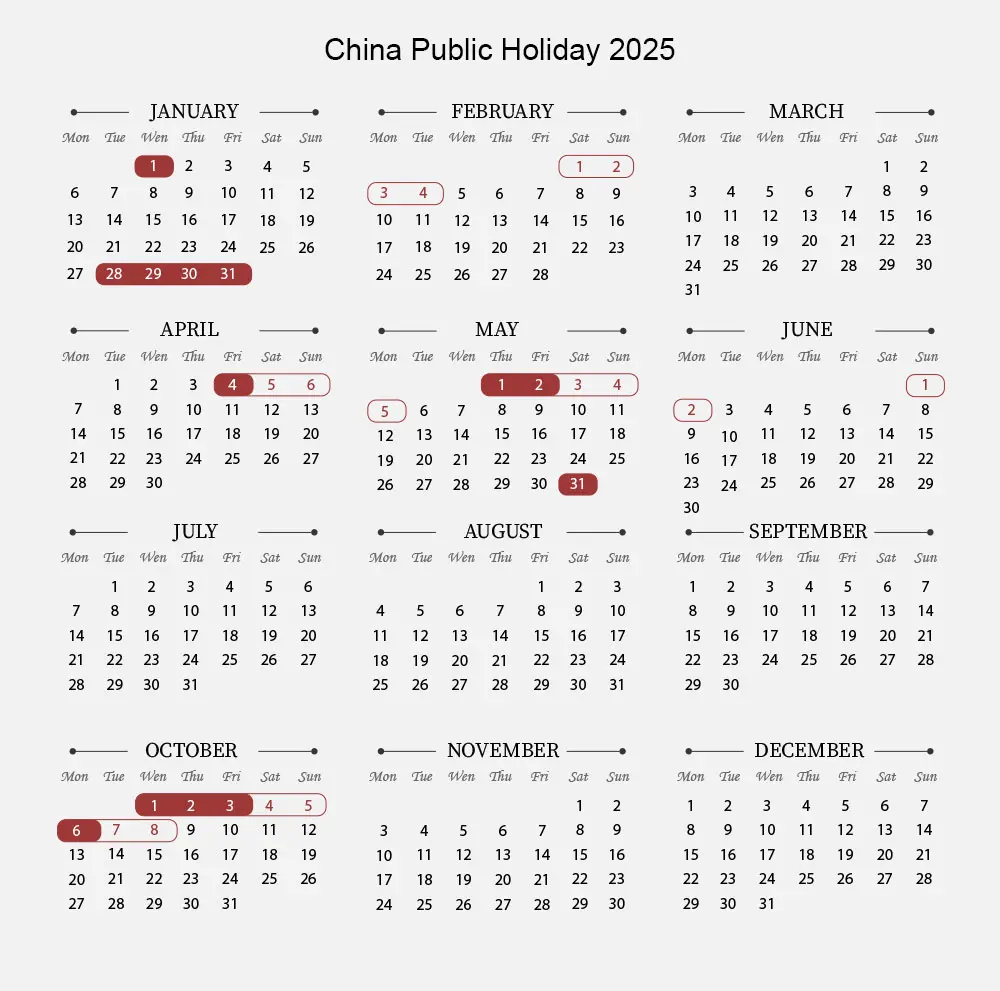2025 China Public Holidays Calendar: A Comprehensive Guide
Related Articles: 2025 China Public Holidays Calendar: A Comprehensive Guide
- Large Print Calendars 2025: A Comprehensive Guide To Enhanced Visibility And Organization
- Disney Calendar 2025: A Magical Journey Through The Year
- Editable Yearly School Calendar 2025: A Comprehensive Guide
- Calendario 2025 Para Escribir: Una Guía Integral
- 2025 Calendar: A Comprehensive Guide For Planning And Organization
Introduction
In this auspicious occasion, we are delighted to delve into the intriguing topic related to 2025 China Public Holidays Calendar: A Comprehensive Guide. Let’s weave interesting information and offer fresh perspectives to the readers.
Table of Content
Video about 2025 China Public Holidays Calendar: A Comprehensive Guide
2025 China Public Holidays Calendar: A Comprehensive Guide

Introduction
China, a country steeped in tradition and cultural heritage, observes a diverse array of public holidays throughout the year. These holidays provide citizens with much-needed respite from their daily routines and an opportunity to celebrate significant cultural events, national milestones, and festivals. The 2025 China public holidays calendar is no exception, offering a rich tapestry of festivities and commemorations. This comprehensive guide will delve into each holiday, exploring its historical roots, cultural significance, and practical implications for travelers and residents alike.
New Year’s Day (January 1)
The first day of the Gregorian calendar marks the beginning of a new year, celebrated with great fanfare across China. Businesses and schools close for three days, allowing families to gather for feasts and fireworks displays. The holiday is also a time for reflection and setting new goals for the year ahead.
Spring Festival (January 22-28)
Also known as the Chinese New Year, the Spring Festival is the most important holiday in the Chinese calendar. It marks the end of winter and the beginning of spring, and is celebrated with a week-long series of festivities. Families reunite for sumptuous dinners, exchange red envelopes filled with money, and watch traditional lion and dragon dances.
Qingming Festival (April 5)
This traditional festival commemorates the deceased and is observed by visiting ancestral tombs, offering food and flowers, and burning incense. It is also a time for families to connect with their roots and reflect on their heritage.
Labor Day (May 1)
International Labor Day is celebrated worldwide, recognizing the contributions of workers and laborers. In China, this holiday is typically observed with parades, speeches, and cultural performances.
Dragon Boat Festival (June 2)
This festival commemorates the life and death of the ancient poet Qu Yuan. It is celebrated with dragon boat races, the eating of zongzi (sticky rice dumplings), and the hanging of colorful streamers.
Mid-Autumn Festival (September 29)
Also known as the Moon Festival, the Mid-Autumn Festival is a time for families to gather under the full moon. It is celebrated with mooncakes, lantern displays, and firecrackers.
National Day (October 1)
National Day marks the founding of the People’s Republic of China in 1949. It is celebrated with parades, fireworks, and cultural performances.
Chongyang Festival (October 14)
This festival is dedicated to honoring the elderly. It is celebrated by climbing mountains, drinking chrysanthemum wine, and spending time with loved ones.
Winter Solstice (December 22)
The Winter Solstice marks the shortest day of the year and the beginning of winter. It is celebrated with the eating of glutinous rice balls (tangyuan) and the gathering of families for warmth and comfort.
Christmas (December 25)
While not an official public holiday in China, Christmas is increasingly celebrated in major cities, particularly among younger generations. It is a time for exchanging gifts, decorating Christmas trees, and enjoying festive meals.
Practical Considerations
Business Closures:
During public holidays, most businesses and government offices will be closed. However, some tourist attractions, restaurants, and shopping malls may remain open with reduced hours.
Transportation:
Public transportation services may experience increased congestion during holiday periods. It is advisable to plan ahead and book tickets in advance, especially for long-distance travel.
Accommodation:
Hotels and guesthouses may experience high demand during public holidays. Booking accommodations well in advance is recommended to secure the best rates and availability.
Cultural Etiquette:
When visiting China during public holidays, it is important to be respectful of local customs and traditions. Be mindful of noise levels, avoid public displays of affection, and dress appropriately for the occasion.
Conclusion
The 2025 China public holidays calendar offers a unique opportunity to immerse oneself in the rich cultural tapestry of this fascinating country. From the vibrant celebrations of the Spring Festival to the solemn observances of the Qingming Festival, each holiday holds its own significance and provides a glimpse into the traditions and values of the Chinese people. Whether you are a seasoned traveler or a first-time visitor, embracing the spirit of these holidays will undoubtedly enhance your experience and create lasting memories.







Closure
Thus, we hope this article has provided valuable insights into 2025 China Public Holidays Calendar: A Comprehensive Guide. We hope you find this article informative and beneficial. See you in our next article!